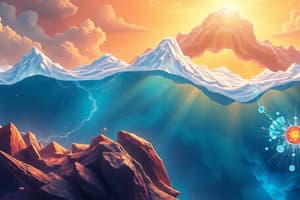Podcast
Questions and Answers
Which of the following is an example of a physical change?
Which of the following is an example of a physical change?
- Cooking an egg
- Rusting of iron
- Melting of ice (correct)
- Burning of wood
Which property of matter refers to its resistance to being scratched?
Which property of matter refers to its resistance to being scratched?
- Hardness (correct)
- Reactivity
- Color
- Density
In which state of matter are particles arranged in a fixed, definite pattern?
In which state of matter are particles arranged in a fixed, definite pattern?
- Gas
- Solid (correct)
- Liquid
- Plasma
Which of the following is NOT a mixture?
Which of the following is NOT a mixture?
What type of properties include reactivity and solubility?
What type of properties include reactivity and solubility?
What is the process involved in separating mixtures where a liquid is heated and changed into vapor to leave behind solid impurities?
What is the process involved in separating mixtures where a liquid is heated and changed into vapor to leave behind solid impurities?
In which type of chemical reaction do substances break down into simpler compounds?
In which type of chemical reaction do substances break down into simpler compounds?
When iron reacts with oxygen to form rust, what type of change is this an example of?
When iron reacts with oxygen to form rust, what type of change is this an example of?
What is the process of combining elements or compounds to form a new substance known as?
What is the process of combining elements or compounds to form a new substance known as?
Which type of separation technique is most suitable for separating a mixture of salt and sand?
Which type of separation technique is most suitable for separating a mixture of salt and sand?
Flashcards are hidden until you start studying
Study Notes
Discovering the Building Blocks Around Us: Matter, Properties, and Transformations
Matter is the substance that makes up our world, and understanding it is fundamental to our daily lives. As we delve into the properties, states, and interactions of matter, we'll discover its intricate complexities and marvel at its versatility.
Properties of Matter
Properties are the characteristics of matter that can be observed or measured. These include physical properties like color, hardness, density, and melting point, as well as chemical properties like reactivity and solubility. Understanding these properties is essential for identifying and classifying materials.
Physical Changes
Physical changes are alterations in matter that do not form new substances. Examples include melting, freezing, boiling, condensing, and dissolving. When ice melts, it changes its state, but it remains water, a pure substance.
States of Matter
Matter can exist in three basic states: solid, liquid, and gas. Each state has its own characteristics, such as the way particles are arranged (solid), the way particles flow (liquid), and the way particles are spread out (gas). Understanding these states allows us to predict and control how substances will behave.
Mixtures
Mixtures are combinations of substances that do not separate easily and do not form chemical bonds with each other. Examples of mixtures include salt and water (solution) and sand and water (suspension). Mixtures can be separated through processes like filtration, evaporation, or distillation.
Chemical Changes
Chemical changes, or chemical reactions, involve the breaking and forming of chemical bonds, resulting in the formation of new substances. When iron rusts, it reacts with oxygen and forms rust, a new substance. Chemical reactions can be classified as synthesis (formation of new substances), decomposition (breaking down of substances into simpler compounds), or combination (combining of elements or compounds to form a new substance).
Summary
Understanding the properties, states, and transformations of matter provides us with the tools to analyze, categorize, and manipulate the world around us. By exploring these topics, we can develop a deeper appreciation for the natural world and a desire to continue learning about the nature of matter. Whether you're a student studying chemistry or simply a curious person seeking knowledge, delving into these topics will open up a world of possibilities.
Studying That Suits You
Use AI to generate personalized quizzes and flashcards to suit your learning preferences.




